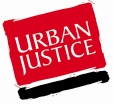 | Urban Justice Center 40 Rector Street, 9th Floor, New York, NY 10006 Tel: (646) 602-5617 - Fax: (212) 533-4598 |
PRESS RELEASE
| For Immediate Release: | Contact: | Sienna Baskin (646) 602-5695 sbaskin@urbanjustice.org |
| Monday, August 16, 2010 | or | Melissa Broudo (646) 459-3024 mbroudo@urbanjustice.org |
Governor Patterson Signs First In the Nation Bill Allowing Survivors of Sex Trafficking to Clear Prostitution Convictions
Bill Closes Gaps in Safe Harbor Act and Anti-Trafficking Law
Sex Workers Project - Bill Co-Author - Applauds Landmark Fresh Start for Trafficking Victims & Creation of National Model
(New York City, August 16, 2010) - On Saturday, Governor David Paterson signed first in the nation legislation allowing survivors of commercial sex trafficking to clear their records of prostitution-related crimes by vacating their convictions. The bill (A.7670/S.4429), passed by the Assembly in May and the State Senate in June, will amend New York State Criminal Procedure Law.
"Today, survivors of sex trafficking around New York are getting a chance to make a fresh start,"
said Sienna Baskin, Co-Director of the Sex Workers Project at the Urban Justice Center. "It's a hard reality that trafficked people are often arrested, convicted, and released without the justice system realizing what's really going on. For these survivors, a criminal record for prostitution is a barrier when they apply for a job, immigration status, or housing. With this landmark legislation, New York has created a model that will help end treatment of these survivors as criminals. We hope the rest of the country follows New York's leadership."
"Victims of sex trafficking who are forced into prostitution often are saddled with a criminal record,"
said Assembly Member Richard N. Gottfried, the bill's author. "Even after they escape from trafficking, that criminal record blocks them from decent jobs and a chance to rebuild their lives. This bill will give them a desperately needed second chance they deserve."
The Sex Workers Project helped Assembly Member Gottfried draft this bill to strengthen the protections for trafficked persons. He introduced the bill in the Assembly in April 2009; Senator Thomas Duane sponsored the legislation in the Senate.
The bill will provide relief to sexually exploited youth, defined as trafficked under federal law. Despite New York's Safe Harbor Act, over 90% of youth arrested for prostitution are charged in Criminal Court, where their convictions could result in a criminal record that until now would follow them through their lives.
"Some of our clients, survivors of trafficking into commercial sex, were arrested more than 10 times before escaping their coercive circumstances. Their fears of arrest or deportation prevented them from going to law enforcement for help," added Baskin. "These survivors have suffered enough and simply want to move on with their lives - by finding a good job and a safe place to live. We believe this bill will help them find that economic security and escape being victimized again."
Other supporters include the New York City Bar Association, the New York Anti-Trafficking Network, the Legal Aid Society, Polaris Project, the Juvenile Justice Coalition, Girls Education and Mentoring Services, the Door, Inc. and Sex Workers Action New York.
Victims of trafficking who will benefit from the legislation include:
Maria*, a client of the Sex Workers Project: Originally from Central America, Maria moved to New York with her fiancé, who quickly became abusive. In 12 years of marriage, he physically, sexually, and psychologically abused her and eventually forced her into prostitution. Maria was arrested over eight times; a monolingual Spanish speaker, she never understood her rights. After her husband Jorge* disappeared in 2005, Maria became a recognized victim of trafficking and was granted a T-visa. She began a career as a home health attendant, employed by the Department of Health (DOH); five years later, the DOH ran her fingerprints and terminated her upon discovering her criminal record. Even after three years of advocacy, she was never rehired. Once her convictions are vacated, Maria will no longer have to disclose and explain her criminal record for prostitution to future employers.
Kate*, a client of the Sex Workers Project: Raised in a New York City suburb, Kate ran away from home at age 14 to escape her father's physical and verbal abuse and her mother's inability to protect her due to addiction. With nowhere to live, Kate was forced to engage in survival sex: sleeping with men for a place to stay. She was soon recruited and forced to work for a pimp. This violent and abusive older man cut off her contact with the outside world by confiscating her cell phone, and forced her to work for two years and across multiple cities. She suffered multiple rapes by customers, once at gunpoint. Despite six arrests for prostitution, police never discovered that she was an underage victim of trafficking. Shy of her 17th birthday, Kate escaped and got into an out-of-state recovery program. She returned to New York and bravely testified against her pimp, enduring death threats to help send him to prison for 12 years. Now in her 20's, Kate lives on her own, and is pursuing her education and career dreams. Her desire for a career in finance has already led to one mandatory disclosure of her prostitution record. In addition to the professional barrier, that experience remains psychologically traumatizing.
* Not their real names.
Founded in 2001, the Urban Justice Center's Sex Workers Project provides legal services to people who are in the sex trade by choice, coercion, or circumstance. Clients of the Sex Workers Project include sex workers and survivors of trafficking from within and outside of the United States.